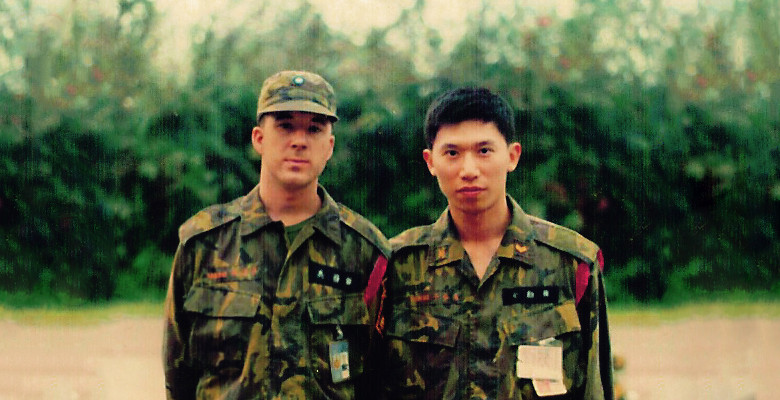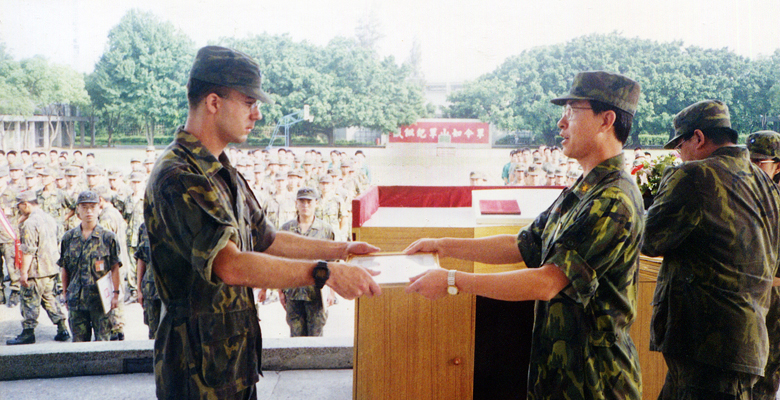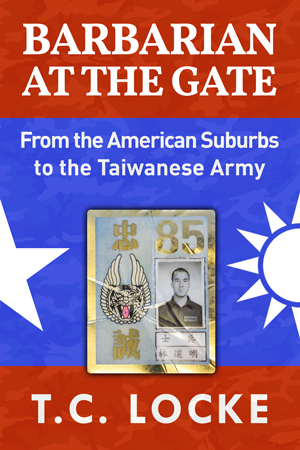
T.C. Locke is an ex-American who renounced his citizenship in order to naturalise in Taiwan. Now known as a cultural polymath—an accomplished photographer, musician, writer, and film director—Locke (who also goes by the name T.C. Lin) was perhaps the first Westerner to be called up for mandatory military service in Taiwan. The newly published Barbarian at the Gate is his account of the two years he spent in the army, and it’s a fascinating window into a side of life in Taiwan that few of us see. He has also directed a feature film, The Kiss of Lady X, an action thriller shot in Taiwan which premiered at the Urban Nomad film festival last month, and released the Golden Melody Award-nominated Formosa Medicine Show with the Muddy Basin Ramblers, all in the last year. We caught up with T.C. to ask him a few questions about his unusual story.
Taiwan Ho!: The ROC military is a closed world to most non-Taiwanese. What do you think people who have never served would find most surprising about the life of a conscript?
T.C. Locke: I’d guess most people who haven’t been through it would be surprised at how complicated the social interactions can be. It’s not just running around taking orders; military rules and regulations are only the veneer on top of a dense network of long-held Confucian ideals intermixed with petty sniping worthy of any business office or schoolyard. As everyone has to serve in Taiwan, at least every male citizen, virtually all sectors of society here are represented in a way that would be difficult to find anywhere else, and that makes for an interesting mix of values, to say the least.
Which part of your two years in the army did you enjoy most?
The army isn’t exactly made for enjoyment, but there were enjoyable moments. I was always happy to get out on leave, of course, but on base I was happiest on fine afternoons before dinner when we had a bit of free time from strict training and could play ball or just sit around chatting while cleaning our rifles or polishing our boots. The base, in the hills above Miaoli (it is abandoned now), was actually in a pretty area with fresh air, so it was nice when I got a chance to appreciate the beauty of the surroundings.
Do you feel your experience in the military changed you? If so, how?
After I finished my service, I went back to live in Taipei, working for the same television station as a cameraman and even living in the same apartment I’d live in before I’d been drafted (my landlord had used my room to play mahjong for two years). Yet everyone who knew me before told me I was different, more at ease with my surroundings; some even said I was more dependable. The reason for this, I think, lies not only in living in an unforgivingly tense Taiwanese environment 24/7 for two years, but also in my reaction to and adoption of one of the aspects of Taiwan that had attracted me from the beginning, and that is the fluidity of identity that is the result of the various outside influences that have shaped this island and its people over the centuries. I found in the army that by embracing the fluidity of my own identity, i.e. not forcing myself to be more Taiwanese, or more Western, or more whatever, than I was, was one of the keys to getting along in such an environment.
You previously wrote a Chinese-language book about your time in the military called Counting Mantou. Did you hear any feedback from people you served with?
I was a bit concerned that some of the guys would take issue with what I wrote, but so far nobody has contacted me about it or waited for me in a dark alley with a baseball bat, fortunately.
 Have you visited the PRC since becoming an ROC citizen? If so, what was the reaction when you went through immigration?
Have you visited the PRC since becoming an ROC citizen? If so, what was the reaction when you went through immigration?
I’ve visited the PRC several times on a taibao zheng [the document that Taiwanese people use to travel to the PRC]. A part from a couple of curious glances, I’ve never gotten much of a reaction from the immigration staff. I got a greater reaction from the immigration people in LA (“Now I’ve seen everything,” said the man at the desk as he looked at my passport). I’ve been taken for a Uighur on several occasions when traveling in China, and I don’t generally bother to correct them if it saved me the trouble of explaining that I’m actually Taiwanese.
How did your family react to your renunciation of your US passport and conscription?
At the time, I simply didn’t tell them. In fact, during the 1996 missile crisis in the Taiwan Strait, I got letters from my parents warning me to get out of Taiwan because there was going to be a war. I couldn’t bring myself to tell them that I was actually a Taiwanese soldier at that point. I did tell them everything after I got out; they weren’t happy, of course, and while my siblings seem ok with it, my parents are to this day unable to understand why I would do such a thing.
Do you get any negative reactions from people (local or otherwise) to you being an ROC citizen?
I’ve never gotten a negative reaction from any Taiwanese people, or any Chinese people for that matter. A few Westerners have been unable to accept it; one of my professors at film school in the U.S. told me it was “stupid.” Certain ex-pats in Taiwan who feel that they shouldn’t be asked to renounce their original citizenship to obtain ROC citizenship don’t seem to appreciate the fact that I’ve done so.
Last year the death of Hung Chung-chiu hit the news and was the source of huge protests. For readers who didn’t hear of it at the time, Hung was a corporal just days away from the end of his conscription who died after excessive and inhumane punishment. What do you make of the case?
It’s a tragedy, of course. The simple fact that we even heard about it, that so many people got out to protest it, however, actually represents an improvement over the way things operated in the past. Such cases, if they happened when I was in the army (and they most certainly did), were passed off as suicides or never even reached the public’s ears. Some of those cases are still just coming to light today, and in this era of ubiquitous Internet access and 24-hour news coverage, such incidents are not only less likely to occur, but if they do, the military will have a much harder time covering them up.
How do you think Taiwanese society will change when the military becomes an all-volunteer force?
It’s difficult to say. While the military draft culture certainly has its drawbacks, I can’t help but believe that the experience has also had a positive influence on many generations of Taiwanese men in the area of learning not only how to get along in this society but to be relatively self-reliant as opposed to depending on their families and other connections. Without such an experience, most men wouldn’t have ever had any contact with social strata other than their own. And while I’m sure most men would appreciate not having to spend months of their lives doing something they don’t want to do, it is a good exercise in patience and a good opportunity to pursue areas one might not otherwise be exposed to. However, I also think not having the cloud of impending soldier-hood hanging over your head would be a good thing in almost every other aspect.
Barbarian at the Gate is dedicated to your college professor, Dr. Harold C. Hill. Can you talk a little about his influence on your life?
Professor Hill was my first Chinese language teacher, the first of my professors I met at Washington & Lee, and eventually a great friend and mentor, though he always gave me a hard time about my Taiwanese accent (he taught the standard mainland Chinese accent in his classes). As I was rather introverted and not at all the typical outgoing, fraternity-belonging student at W&L, Professor Hill was there for me and gave me a lot of useful advice and perspectives not only about life in the U.S. but also about life in Taiwan, where he lived for many years.
Your feature-length directorial debut The Kiss of Lady X was released last month. What kind of reception did it get?
The Kiss of Lady X premiered at the Urban Nomad Film Festival in Taipei, and the reception was wonderful. We’d been bumped up to the larger theater at Lux Cinemas in Ximending after selling out the smaller one, and it was extremely gratifying to see so many people out to see it. The audience reaction was even better than I’d expected, with them bursting into applause at several points in the film. So many people have worked so hard and so long on this project, and it was great to see it completed and showing on the big screen.
You shot the movie guerilla-style on a very tight budget. Did you get yourselves into any dicey or unpleasant situations during filming?
Yes, several times. We operated on the principle that it’s easier to ask for forgiveness than permission, or we couldn’t have finished the film for just a couple thousand dollars. At one point I was filming a scene in one end of an abandoned building just as the other end was being torn down. Another time I filmed a gunfight/car chase from a scooter while I drove with one hand. We were kicked out of a few places, but we managed to finish what we could, and we simply found another place that would stand in well enough to continue.
What are you working on at the moment? Any interesting plans for the future?
I’ve been more active in photography these days. Since I co-founded the international photography collective Burn My Eye a few years ago, we’ve been working on projects and exhibitions and the like, and I’ve held exhibitions here in Taiwan as well as abroad recently. As far as film goes, I’d like to make a Taiwanese film, i.e. a local story with local actors. Lady X was an international action movie, but I’d like to utilize more of what Taiwan has to offer in other aspects besides backdrops for scenes set in other countries.

Barbarian at the Gate is published by Camphor Press, and is available now in e-book format for your e-reader, PC, smartphone, or tablet priced NT$240 (US$7.99).
You can download your copy from the Camphor Press website, from Amazon, or—if you have an Apple device—from iTunes.
The Muddy Basin Ramblers will be back in action after a six-month hiatus later this summer, with T.C. returning on washtub bass, trumpet and euphonium.
The Kiss of Lady X will be available on DVD later in the year.



